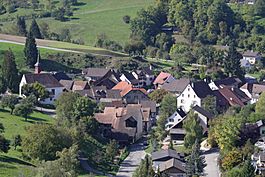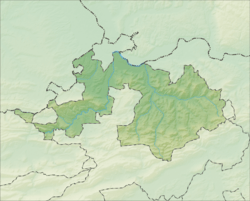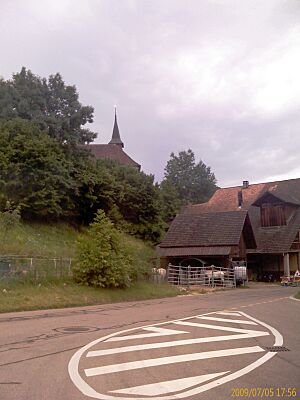Wintersingen facts for kids
Quick facts for kids
Wintersingen
|
||
|---|---|---|
 |
||
|
||
| Country | Switzerland | |
| Canton | Basel-Landschaft | |
| District | Sissach | |
| Area | ||
| • Total | 6.95 km2 (2.68 sq mi) | |
| Elevation | 430 m (1,410 ft) | |
| Population
(Jun 2021 )
|
||
| • Total | 637 | |
| • Density | 91.65/km2 (237.4/sq mi) | |
| Postal code |
4451
|
|
| Surrounded by | Buus, Magden (AG), Maisprach, Nusshof, Rickenbach, Sissach | |
Wintersingen is a small town, also called a municipality, located in the Sissach district. It is part of the canton of Basel-Country in Switzerland.
Contents
Geography of Wintersingen
Wintersingen covers an area of about 6.95 square kilometers (2.68 sq mi). A big part of this land, about 57.6%, is used for farming. This includes fields for crops, pastures for animals, and areas for fruit trees.
About 34.5% of Wintersingen is covered by forests. The rest of the land, about 6.9%, has buildings and roads. A very small part, 0.1%, is made up of rivers or lakes.
Wintersingen's Coat of Arms
The official symbol of Wintersingen is its coat of arms. It shows three silver arrows pointing upwards on a red background. This design is called Gules, three Arrows bendwise Argent in the language of heraldry.
People and Population
Wintersingen has a population of about 637 people. Most of the people living here are Swiss citizens. A small number, about 5.7%, are foreign nationals.
Over the past ten years, the number of people living in Wintersingen has changed a little. In 2008, the population was almost evenly split between males (48.8%) and females (51.2%).
Languages Spoken
Most people in Wintersingen speak German, which is about 95.9% of the population. The second most common language is Albanian, spoken by about 1.7% of residents. A small number of people also speak French.
Where People Were Born
In 2000, about 42.5% of the people in Wintersingen were born there. Another 22.8% were born in the same canton (Basel-Country). About 26.2% were born in other parts of Switzerland, and 8.2% were born outside of Switzerland.
Population Changes Over Time
The population of Wintersingen has changed over many years. Here is a chart showing how the population has grown or shrunk:

Important Sights
The entire village of Wintersingen is considered a special place. It is listed as part of the Inventory of Swiss Heritage Sites. This means it has historical or cultural importance and is protected.
Economy and Jobs
In 2010, Wintersingen had a low unemployment rate of 1.5%. This means most people who wanted to work had jobs.
Types of Jobs
Jobs in Wintersingen are divided into three main groups:
- Primary Sector: This includes jobs related to nature, like farming. In 2008, about 37 people worked in this sector.
- Secondary Sector: These jobs involve making things, like in factories or construction. About 22 people worked in this sector.
- Tertiary Sector: This includes jobs that provide services, like shops, transportation, education, and healthcare. About 57 people worked in this sector.
Many people who live in Wintersingen travel to other towns for work. In 2000, 243 people commuted out of the municipality, while only 26 people commuted in. Most people (66.1%) used a private car to get to work, while 12.3% used public transportation.
Religion in Wintersingen
According to the 2000 census, most people in Wintersingen are Christian. About 72.3% belonged to the Swiss Reformed Church (a Protestant church). Another 10.9% were Roman Catholic.
A small number of people belonged to other Christian churches, or to Islam (about 1.87%). There was also one person who was Buddhist. About 12.76% of the population did not belong to any church or were agnostic or atheist.
Education in Wintersingen
Education is important in Wintersingen. About 44.6% of the population has finished upper secondary education, which is like high school.
About 13.8% of people have gone on to higher education, either at a university or a specialized college (called a Fachhochschule). Most of these people were Swiss men.
In 2000, 37 students from Wintersingen went to schools outside the municipality. Only 5 students from other towns came to school in Wintersingen.
See also
 In Spanish: Wintersingen para niños
In Spanish: Wintersingen para niños
 | Shirley Ann Jackson |
 | Garett Morgan |
 | J. Ernest Wilkins Jr. |
 | Elijah McCoy |





